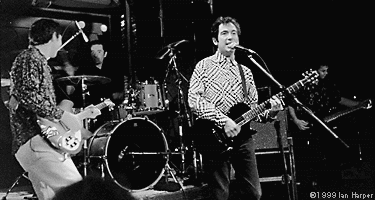Post by Taxigirl on Oct 23, 2003 10:28:51 GMT

b. Peter McNeish, 17 April 1955, Leigh, Lancashire, England. When the Buzzcocks disbanded in 1981, Shelley soon embarked on a variety of solo projects. In fact, his solo history extended before, and during, the Buzzcocks career. As one of the Invisible Girls, he helped out on John Cooper Clarke albums while the Buzzcocks were still active. Around the same time he also launched his own independent label, Groovy. On this he released Free Agents (subtitled Three Pounds And Thirty Three R.R.P., which was also its original price). This consisted primarily of tape loops and feedback, and general free-for-all improvisation. Meanwhile, on New Hormones (the Buzzcocks' original label) came The Tiller Boys EP, another of Shelley's pet projects. The second release on Groovy was Sky Yen, a solo album originally recorded by Shelley in 1974 using electronic instruments. Much akin to work by Kraftwerk, it prefaced the electronic feel of his later solo work. However, it was 1982's Homosapien, a weighty slice of electro-pop concerning bisexuality, that marked the high point in Shelley's solo career. It was produced by Martin Rushent as a launch for his Generic label, and caused much discussion of Shelley's sexuality, and a re-examination of his Buzzcocks lyrics. XL1 in 1983 was more tame, although it did boast the novelty of including a Sinclair computer programme that reproduced the lyrics. One review compounded matters by mentioning no less than five Buzzcocks titles in comparison - a trifle unfairly. Again, it was produced by Rushent, this time with a predominantly disco feel.

After 1986's Heaven And The Sea Shelley sought the comfort of a band again, and attempted to retain anonymity in Zip. He re-formed the Buzzcocks in 1989, enjoying an artistic and critical renaissance with the studio recordings Trade Test Transmissions, All Set and Modern. In October 2000 he reunited with the Buzzcocks' co-founder Howard Devoto under the Buzzkunst moniker. The duo recorded a well-received album which owed little to their respective musical pasts.


